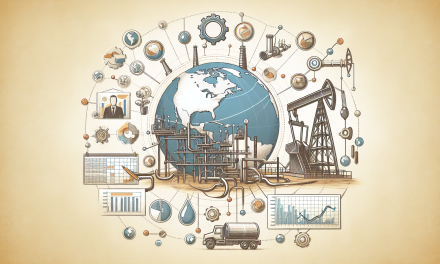Table of Contents
- Understanding Hydrocarbons
- The Importance of Operations Training
- Core Concepts of Hydrocarbon Production
- Emerging Trends in Hydrocarbon Production
- Strategies for Career Growth in Hydrocarbon Production
- Frequently Asked Questions
- Conclusion
Understanding Hydrocarbons
Hydrocarbons, the building blocks of the oil and gas industry, play a crucial role in energy production and fuel supplies globally. Primarily, they consist of hydrogen and carbon and exist in various forms, including solids, liquids, and gases. As a vital source of energy, hydrocarbons are fundamental to manufacturing processes and daily energy consumption. The ability to efficiently produce and manipulate hydrocarbons is essential for the growth and sustainability of the energy sector.
The Science Behind Hydrocarbon Production
Producing hydrocarbons involves a harmonious blend of science and technology. The journey begins with exploration, where geologists and geophysicists employ advanced techniques and equipment to locate potential reserves. Once identified, engineers employ various extraction methods, including conventional drilling, hydraulic fracturing, and enhanced oil recovery methods. Each technique offers distinct advantages and is chosen based on the reservoir characteristics.
The Role of Technology
Recently, technological advancements have transformed hydrocarbon production operations. Innovations such as real-time data monitoring, automation, and machine learning are helping professionals optimize production efficiency and mitigate risks. Staying updated with these technologies is key for anyone aspiring to make a significant impact in the field.
The Importance of Operations Training
To thrive in the competitive energy sector, professionals must engage in continuous learning. Operations training in hydrocarbon production facilitates skill enhancement and ensures individuals are well-equipped to tackle the industry’s challenges. By mastering operational techniques, understanding regulatory standards, and learning about safety protocols, professionals contribute significantly to their organizations’ success.
Benefits of Effective Training
The advantages of thorough operational training extend beyond just personal skill enhancement. They include:
- Improved Safety: Knowledge of safety protocols minimizes risks and enhances workplace safety.
- Increased Efficiency: By understanding production processes, professionals can streamline operations and reduce costs.
- Career Advancement: Continuous learning opens doors for promotions and new opportunities.
- Networking Opportunities: Training often brings professionals together, fostering connections that can benefit one’s career.
Core Concepts of Hydrocarbon Production
Professionals looking to excel in hydrocarbon production should familiarize themselves with several core concepts:
Drilling and Extraction
Understanding drilling techniques and extraction methods is fundamental. Each method has unique considerations, including geological formations and environmental impact. The Mini-Master in Hydrocarbon Production Operations Course provides insights into these various methods, ensuring participants can apply the most effective techniques.
Production Techniques
Production techniques, such as enhanced oil recovery (EOR) and water flooding, can greatly enhance the amount of oil extracted from a reservoir. Staying abreast of these techniques can significantly impact a professional’s understanding and production effectiveness.
Refining Process
Once extracted, hydrocarbons undergo refining processes to convert raw materials into usable products. Knowledge of this process enhances an individual’s comprehension of product life cycles and market demands.
Analytics in Production
Employing data analytics in hydrocarbon production helps track performance metrics, optimize production schedules, and enhance recovery rates. Understanding how to interpret data enables professionals to make informed and effective decisions.
Emerging Trends in Hydrocarbon Production
The hydrocarbon production landscape is evolving rapidly. Professionals must keep pace with emerging trends that influence production operations:
Sustainability
In recent years, the focus on sustainability has intensified within the industry. Companies are increasingly investing in renewable energy sources, reducing emissions, and implementing eco-friendly practices. Understanding these trends prepares professionals to align strategies with the growing emphasis on environmental responsibility.
Digital Transformation
The digital transformation of the oil and gas sector is reshaping operational efficiency. Embracing technologies such as the Internet of Things (IoT) and artificial intelligence (AI) enhances the industry’s adaptability and competitiveness. Familiarity with digital tools is essential in today’s landscape.
Political and Economic Factors
Staying informed about geopolitical dynamics and economic fluctuations is crucial. Political stability in oil-producing regions can impact production rates and market prices dramatically. Professionals should develop skills in political risk management, as discussed in this insightful article on Mastering Political Risk Management in the Oil & Gas Sector.
Strategies for Career Growth in Hydrocarbon Production
To advance in hydrocarbon production, individuals should adopt practical strategies:
Continuing Education
Continuous education in the latest industry practices and technologies is imperative. Participating in programs that cater specifically to oil and gas management, like the Mini-Master in Hydrocarbon Production Operations Course, provides invaluable insights.
Networking and Mentorship
Building a network of industry contacts can open doors to new opportunities. Seeking mentorship can provide guidance and accelerate professional growth.
Utilizing Strategic Finance
Financial acumen in managing resources efficiently is a valuable skill. Techniques for maximizing efficiency in financial accounting strategies can greatly assist in enhancing organizational profitability, for which insights can be found in the article Maximizing Efficiency: Finance & Accounting Strategies for the Oil & Gas Industry.
Embracing Automation
As automation in the oil and gas sector continues to rise, embracing these changes can provide a competitive edge. Professionals should be proactive in learning how to utilize automated systems in their daily operations.
Impact of Automation on Efficiency
Automation significantly impacts production efficiency by reducing human error, optimizing processes, and lowering operational costs. Understanding the capabilities of automation can help professionals contribute to more streamlined operations.
Frequently Asked Questions
What is the career path in hydrocarbon production?
The career path in hydrocarbon production can vary widely. Entry-level positions may focus on research and field operations, while advanced roles can include management positions overseeing drilling, production, and financial operations. Continuous learning and networking play vital roles in advancing one’s career.
How can one prepare for a career in hydrocarbon production?
Preparing for a career in hydrocarbon production involves pursuing relevant education, gaining practical experience through internships, and building a robust network within the industry. Engaging in training programs that enhance technical skills is also beneficial.
Conclusion
In closing, the world of hydrocarbon production offers numerous opportunities for professionals willing to invest time and effort into their education and skill development. By understanding fundamental concepts, embracing new technologies, and pursuing effective training, individuals can position themselves for success in this dynamic field. From mastering political risk management to unlocking efficiency through modern control systems, the potential for growth and impact remains substantial in the ever-evolving landscape of the oil and gas industry.
For more resources and insightful content, consider exploring the article on Unlocking Efficiency in Industrial Instrumentation and Modern Control Systems or learning about Effective Risk Management Strategies for Oil & Gas Projects.





